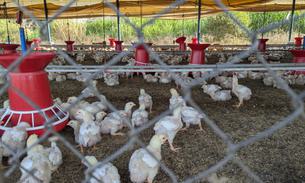
Analysis: Could Syria’s Assad cause civil war in Lebanon?
Violence in Lebanon is believed to play into President Assad’s hands.
A prominent Sunni cleric, well-known as an opponent to Syria’s president Bashar al Assad, was shot by soldiers in Akkar, northern Lebanon nine days ago.
The killing has caused some in Lebanon to fear that Syria’s bloody uprising is spilling over into its neighbour.
Sheikh Ahmed Abdul Wahid and his companion Sheikh Muhammad Hussein Merhbi were shot as they drove through an army checkpoint. Although the clerics were Lebanese, both were known for their support of the Syrian uprising: Wahid was a member of the March 14 alliance, the main political group opposing Assad.
Khaled Daher, a Lebanese politician and member of the March 14 alliance, claimed the killing of the two clerics was deliberate. ‘If shots were fired at the tyres, we would say there was a mistake. But we consider this a direct targeting from the army,’ he told Reuters.
Former Lebanese prime minister Saad Hariri, leader of the March 14 alliance, condemned the killing and said: ‘there is a plan to destabilise some Lebanese regions and stir in trouble to serve the Syrian regime and its tools’.
As news of Sunday’s double killing spread, angry residents in northern Lebanese villages took to the streets and cut off roads using burning tyres, including a highway leading to Syria.
The fact that violence is spreading is no surprise: Lebanon and Syria share a complex web of political and sectarian ties and rivalries, which are easily inflamed.
Unrest in Syria has also escalated Sunni-Alawite tensions in Lebanon. Syrian president Bashar al-Assad, who belongs to the minority Alawite sect, has many followers in Lebanon’s second city, Tripoli. However, the majority of Tripoli’s population are members of the rival Sunni sect. Tensions between the two have sparked recent armed clashes in Tripoli: in the last two weeks around ten people have been killed and at least 24 injured in the city.
Violence between the two sects dates back to at least the start of the Lebanese civil war, which ran from 1975 to 1990 and claimed 200,000 lives.
There has also been an escalation of violence on the Lebanese-Syrian border in recent months: Syrian forces have fired at Lebanese territory on several occasions, and official reports say 11 civilians have been shot. The March 14 alliance believes that factions of the Lebanese army have been infiltrated by pro-Assad agents, particularly near the Syrian-Lebanese borders in the north, inflaming tensions further. However, there is no hard evidence for the claim.
Sectarian strife
This violence in northern Lebanon seems to mirror the fighting in Syria.
The Alawite minority in Lebanon is accused of receiving money, weapons and military training from the Alawite Party in Damascus, while the Sunni majority in Tripoli is accused of arming Syrian rebels across the border.
Last month, Lebanese authorities intercepted a Tripoli-bound cargo ship carrying more than 100 tons of heavy armaments reportedly destined for Syria’s opposition. On May 17, Damascus sent a letter to the UN officially accusing some Lebanese groups of helping al Qaeda and the Muslim Brotherhood to take root along the Syrian border.
‘Some Lebanese areas next to the Syrian border are incubating terrorist elements from al Qaeda and the Muslim Brotherhood, who are messing with the security of Syrian citizens and work on undermining the United Nations Special Envoy’s plan,’ Syrian UN Ambassador Bashar Ja’afari wrote.
Assad claims the armed clashes in Tripoli prove Lebanon is incubating al Qaeda – but Assad’s critics say this is part of his plan to divert attention from Syria by igniting strife in Lebanon.
The latest episode of fighting in Tripoli and killings may be all part of this plan, critics say.
Western commentators claim that Syria has been trying to destabilise the Middle East for years, including spreading chaos in Iraq. They claim it has nurtured Hezbollah in Lebanon and Hamas in Palestine, and caused unrest on its border with Israel.
But how would it benefit from spreading chaos in Lebanon?
Syrian revolutionaries believe Assad is underlining his main claim to power: that his regime is the only safeguard against widespread regional bloodshed.
These unpredictable episodes of sectarian killing in the north are a sign that Lebanon could be on the brink of a second civil war, which means the only way to bring stability back to the country would be to keep Bashar Al-Assad in power.
In October 2011, he even openly warned that he would ‘ignite the Middle East if his regime is threatened’.
The Fars Iranian news agency quoted Assad saying: ‘Damascus will call on Hezbollah in Lebanon to launch a fierce rocket and missile attack on Israel, one that Israeli intelligence could never imagine’.
Experts from the March 14 Alliance and the Free Syrian Army believe that by spreading chaos in Lebanon, Assad is sending the message to the world that he can use the Shiite Alawite card to spark a civil war in Lebanon, and also undermine the predominantly Sunni Gulf monarchies.
Meanwhile, on Sunday evening, bloody clashes using machine-guns and rocket-propelled grenades erupted in Beirut between pro-Assad groups and angry factions protesting against the assassination of Sheikh Abdul Wahid.
Last Wednesday, a group of 11 Lebanese Shiite pilgrims coming back from Iran were abducted inside Syria, prompting their families and thousands of supporters to pour into on the streets of Beirut in protest.
These events taking place in Lebanon indicate that the civil war in Syria may not stay within its borders. The effects of such a war might extend into Lebanon, and into other countries as well.



